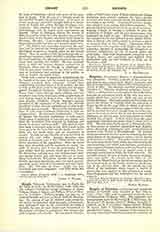

Knighton (CNITTHON), HENRY, a fourteenth-century chronicler. Nothing is known of his career except that he was a canon of St. Mary’s, Leicester, and that he was present when Edward III visited Leicester Abbey in 1363. His chronicle was first published by Twysden in “Historiae Anglican scriptores decem” (1652); a critical edition by Lumby in the Rolls Series contains an exhaustive study of the only two manuscripts which have survived. Both are now in the British Museum. This work consists of five books and covers the history of England from the accession of Edgar in 959 to the year 1366, in which it abruptly ends. The sudden conclusion suggests that the writer died in or about that year, though from an earlier passage in the work we know that he was threatened with blindness, so that he may have been forced to desist through loss of sight. A later writer from the same community continues the story (book V) from 1377 to 1395. The first three books are of no historical value, as they consist of admitted transcripts from Higden, whom Knighton supplements with unacknowledged extracts from Walter of Hemingburgh. He ensured the preservation of his own name by arranging that the initial letters of the chapters in books I and II should spell Henricus Cnitthon. The really important part of his work is the fourth book, which was written from his own knowledge, and which contains facts, particularly with regard to domestic history, not to be found in any other chronicler. A feature of special value is the economic particulars in which the work abounds. He carefully records the rate of wages, the prices of grain, wine, and cattle. He throws much light on the effects of the Black Death on the labor market, and on the inroads made on the feudal system by the liberation of the adscripti glebce. He also details the evil effects of the pestilence which caused a dearth of priests that was supplied by the ordination of candidates ill-prepared and but little suited for the sacred ministry.
EDWIN BURTON

